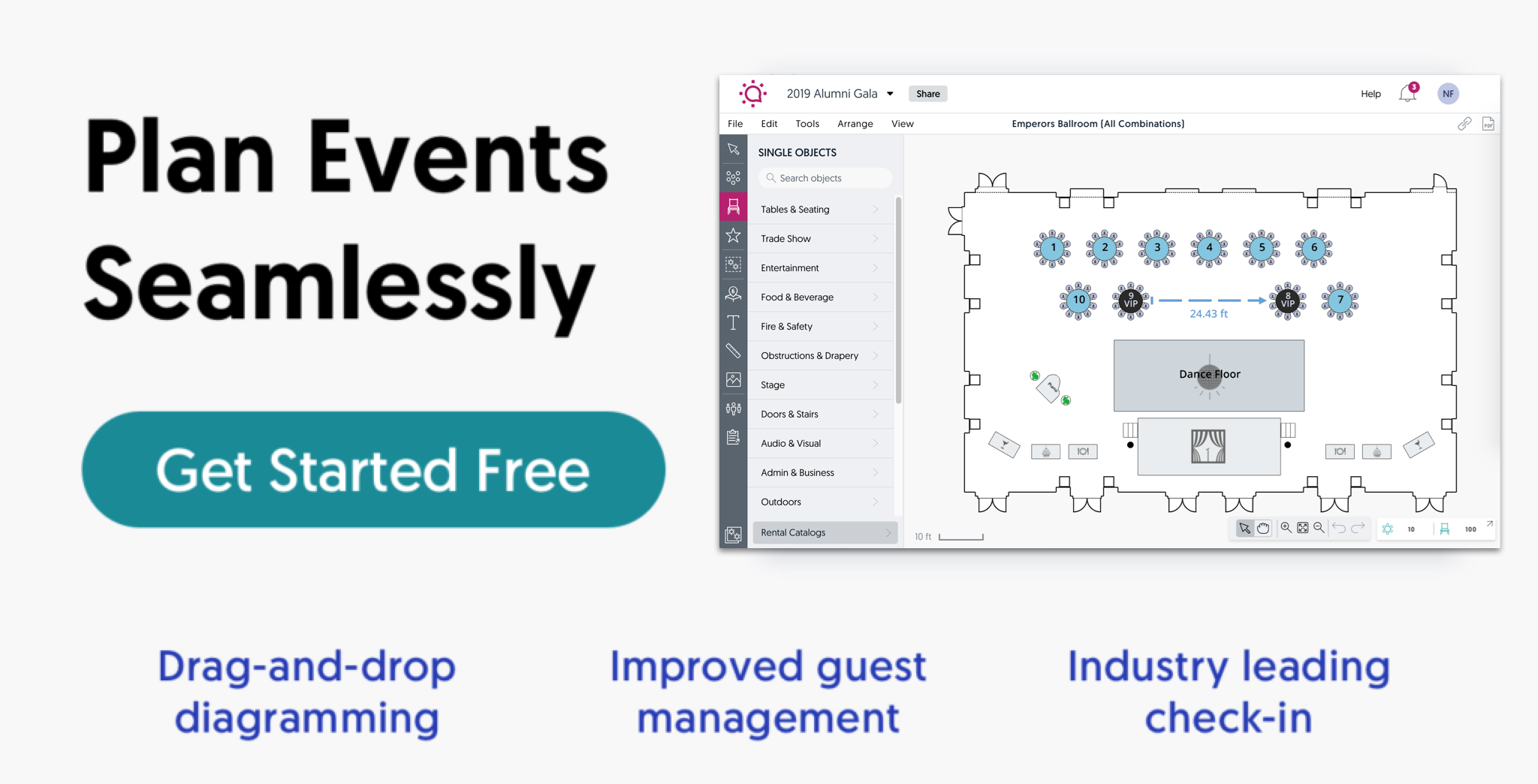
How to Run a Roundtable Discussion in 7 Simple Steps
Roundtables date back to 1155 A.D. when King Arthur popularized the phrase with his group of advisors known as the Knights of the Round Table. Since then, everyone from world powers developing actions for global peace treaties to Fortune 500 companies debating the future of their industries have all learned how to run a roundtable discussion. And so can you! Keep reading to discover some must-know tips for what format this event type follows, what steps you need to take, and the answers to some of the most frequently asked questions surrounding roundtable discussions.
What is a roundtable discussion?
A roundtable discussion is an organized conversation with one moderator, several chosen speakers that bring a variety of perspectives to a subject, and an audience who may simply observe or participate by asking questions. Some events use the roundtable discussion format as a breakout exercise for small groups during a conference or lecture.
Explore how to run a roundtable discussion in 7 simple steps:
Learning how to run a roundtable discussion requires a keen understanding of what roundtables can and cannot do for brands, as well as the steps you absolutely must take to pull it off.
1. Use strategic goals.
If you’re hosting a corporate event of any kind, create a goal that supports the business as a whole and aligns with messaging from active marketing campaigns. For example, tire brands that want to attract stay-at-home mothers should consider using their current taglines or copy as inspiration for roundtable discussion topics.
Moral of the story: Connect the dots between business goals, marketing goals, and event goals to find the best possible roundtable discussion ideas.
2. Pick a type.
There are three main types of roundtable discussions: In-person, virtual, and CEO.
- In-person roundtable discussions are appealing to guests who want to network with speakers but the audience is limited to those who are local or can travel to the venue.
- Virtual roundtable discussions are highly accessible but require more preparation in order to avoid distracting technology issues and awkward conversation.
- CEO roundtable discussions, which are typically done monthly and have a rotating list of industry topics to choose from, host speakers who all run and/or own notable businesses. This type of roundtable discussion is more labor intensive because they are usually recurring or part of a series. They also may involve more expensive speaker fees if participants will be compensated.
3. Find a moderator.
Search for moderators that are charismatic, have a lot of knowledge around the chosen topics, and are recognizable within your industry. Keep in mind that being recognizable does not necessarily mean they are famous on social media or otherwise, but that may be the case. Choose a moderator who has credentials such as experience working with leading brands in your field or have award-winning media such as a book or well-respected podcast.
Before you confirm your moderator, make sure they are interested in either conducting or reading your notes on the necessary research for the speakers, the topic, and the audience. Reach out to social media connections, speakers from past industry conferences, and look within your own company to find the best possible host.
4. Choose speakers.
Tailor the experience to the background of your audience. If they are beginners in the field, look for speakers who have a variety of experience levels. Also, be sure to get a good, diverse spread. As a general rule of thumb, you should book a minimum of three experts who offer different points of view or areas of expertise.
If your roundtable discussion is around a hot topic or a highly-debated one, choose at least two people who will represent both extreme ends of a given spectrum and one person who falls somewhere in the middle or offers a wildcard in terms of their experience.
If your roundtable discussion is less about a debate and more about covering various aspects of one subject area, get a group of niche experts together to form a comprehensive education on the topic. For example, a roundtable discussion on the future of the hotel industry may want subject matter experts who can touch on marketing, technology, the travel industry as a whole, climate change, and hospitality economics.
5. Make an agenda.
Start with a 2-5 minute-long introduction that welcomes the audience and sets the tone of the event. Reiterate the title of the panel and call out any event sponsors or partners. Say each panelist’s name, occupation, and a one-sentence description about what makes them an expert on the subject. Have the moderator introduce themselves too, along with their credentials.
Then, introduce the topic for the event and provide interesting facts, statistics, or anecdotes that illustrate why it’s important in five minutes or less. Write this section with the audience’s perspective in mind. For example, if the roundtable speakers are a group of expert outbound marketers but the audience consists of first-year college students, quickly review the basics of the topic before diving in. Ask moderators to memorize the topic introduction or create a bulleted list of discussion points to hit before moving on.
Next, divide the remaining time by however many questions you plan to ask. Order the questions the way you would a good story: Set the scene, introduce the conflict, offer solutions, and end on a high note. A roundtable discussion on hospital bedside manner, for instance, would begin with a question on the importance of it, followed by why it’s often overlooked and how medical professionals can create a new standard of excellence. When in doubt, stick with the what, why, and how order to create a natural discussion arch.
Finally, conclude by thanking participants and attendees in a quick 1-2 minute wrap up. Add a strong call to action such as signing up for your email newsletter to get invitations for future events or to follow up with speakers on their social media.
6. Listen effectively.
Follow advice from clinical psychologist Jordan Peters, who says the best way to listen is to focus on learning one new thing from each person that you didn’t know before. Dr. Peterson goes on to explain that the host’s job is to help guests “express the truth of the situation.” Help speakers get there faster by making sure they are physically and emotionally prepared with plenty of water, comfortable seating, and information on what they can expect.
7. Capture marketing assets.
Get the most out of your roundtable discussion by turning your event into evergreen marketing content. Transcribe the audio for hearing impaired audiences to enjoy. Share it on your blog to support your inbound marketing or keyword strategy.
Use data from virtual roundtable discussions to get a better understanding of your audience. Capture email newsletter signups and share special product or service offers. Record the roundtable discussion and share it as a video on YouTube, social media, or your website.
Livestream and tweet the discussion to reach audiences on a wide variety of platforms. Further engage audiences through live polls, Q&As, and topic submissions. Survey attendees afterward to learn more about what they like and dislike about your content to improve your next roundtable discussion.
Frequently asked questions about roundtable discussions:
At its highest level, the goal is to share expert advice or relevant industry trends. Roundtable discussions are also great for having conversations about opposing viewpoints on the same topic. Participants and speakers alike takeaway new perspectives and information from every discussion.
To lead a roundtable, you must have a strong meeting agenda, a timer to keep everyone on schedule, and a welcoming personality that will make guests feel comfortable sharing their truths.
Now you know how to run a roundtable discussion!
Now that you know how to run a roundtable discussion and what you’ll need to do it, take your newfound knowledge one step further by maximizing your investment. Follow corporate event management tips to align the roundtable discussion with relevant, big-picture goals. Then, consider hosting or streaming your roundtable discussion online with these must-have virtual event technology tools.


